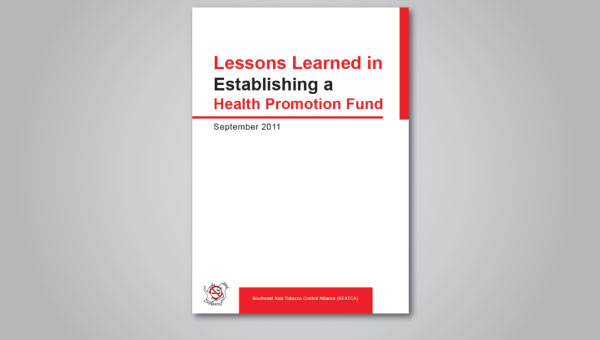While public health is traditionally considered the ambit of ministries of health, given the inter-linkages between various social sectors and the growing trend of globalization and international cooperation, public health should more realistically be deemed a responsibility of all. It is thus of great significance that
the United Nations is convening a historic high-level meeting on the prevention and control of noncommunicable diseases (NCDs) this September 2011, where the roles of governments, civil society, the private sector, and the media will hopefully be defined in relation to a common public health objective. Common to all the four main NCDs (heart disease, lung disease, cancer, and diabetes) is tobacco use. Fortuitously, tobacco control is among the most well researched areas in public health with a growing body of evidence as new regulatory interventions are introduced across the globe. International evidence shows that one of the most cost-effective measures to reduce tobacco consumption and its attendant morbidities is raising tobacco taxes and prices in order to reduce affordability and subsequent consumption, especially among vulnerable populations, such as youths and the poor.
In support of Article 6 (tax and price measures) of the WHO Framework Convention on Tobacco Control (FCTC), SEATCA has undertaken a five-year Southeast Asia Initiative on Tobacco Tax (SITT) in five countries (Cambodia, Indonesia, Lao PDR, Philippines, and Vietnam) to provide research-based evidence and examples of international best practice to policy makers in order to assist them to develop tobacco tax policies that are just and effective in their country context. Together with the WHO Tobacco Free Initiative in the Western Pacific Regional Office (WPRO), SITT has also organized regional forums on sustainable funding for tobacco control and health promotion in order to build much-needed financial and human resource capacity within countries. In this context, SEATCA often promotes the Thai Health Promotion Foundation (ThaiHealth) model. Funded solely from a 2% tobacco and alcohol tax surcharge, ThaiHealth’s financial and programmatic success over the past 10 years has opened the eyes of government officials outside of Thailand to the possibility of sustainable funding for health and social development in their own countries. Given the tsunami of NCDs that is facing our world today, all our countries’ leaders need to commit strongly to preventing and controlling NCDs and their risk factors. This will require enormous financial resources, particularly for low and middle-income countries, but such an investment will be much better than paying the catastrophic price of the growing NCD burden. Thankfully, successful health promotion foundations based on tobacco (and alcohol) taxes have shown the way forward, and political leaders everywhere can assure themselves, “If others can do it, so can we!”


